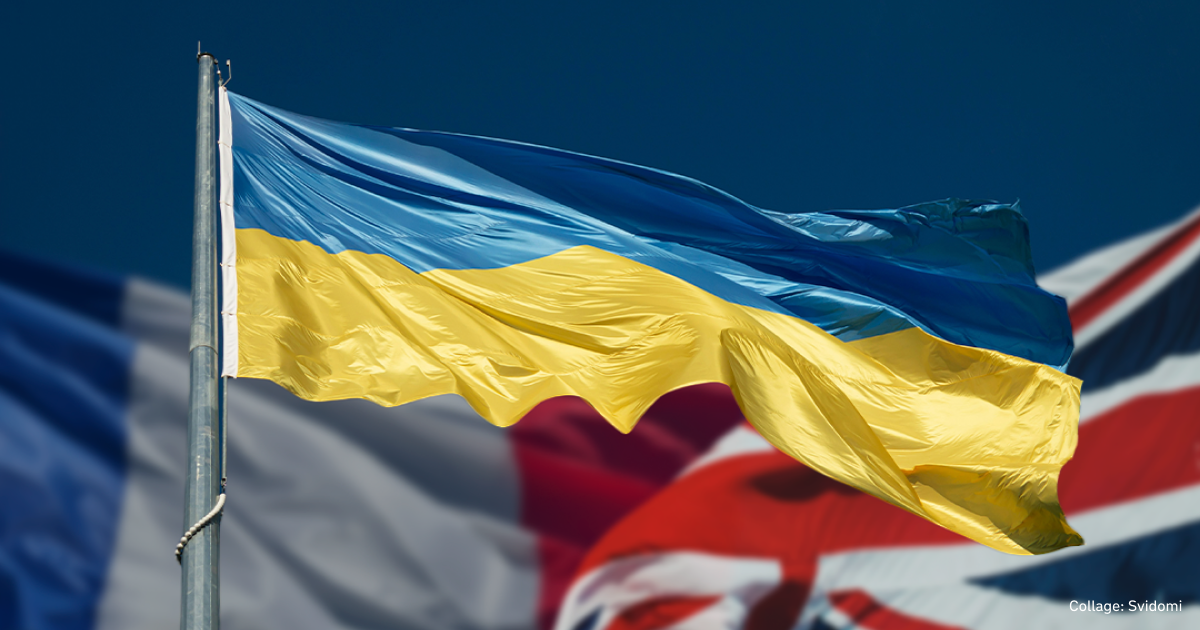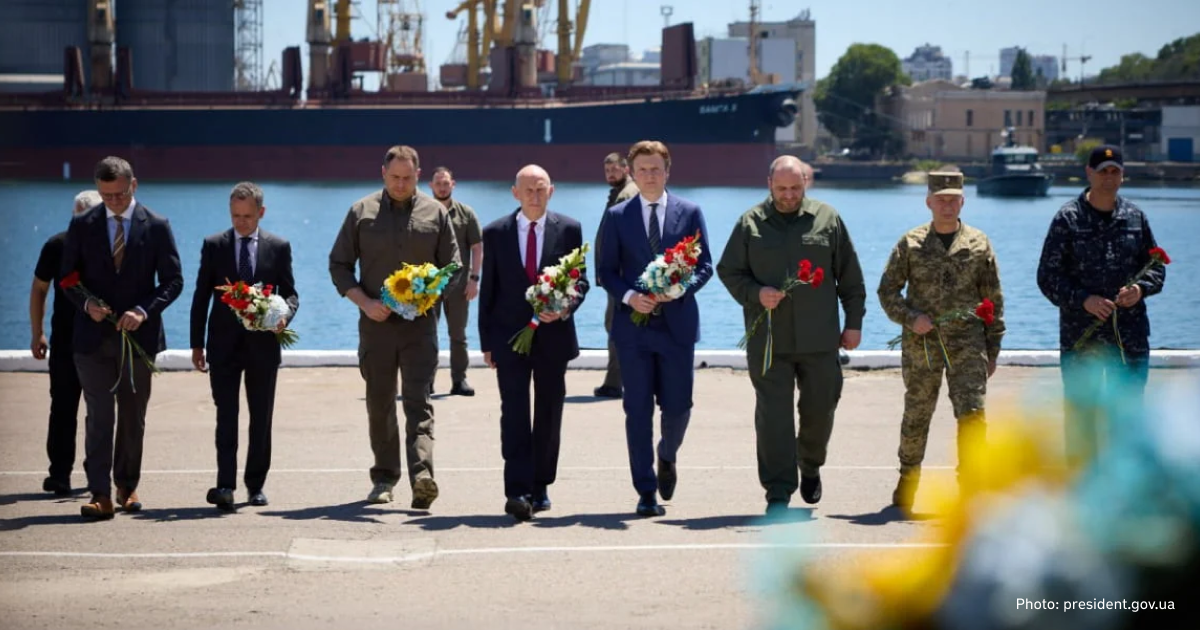Changes in French and British support for Ukraine after the elections

Parliamentary elections were held in France and the UK at the beginning of July. The Labour Party won the elections in the UK and will have more than 400 seats in the new parliament.
According to preliminary data, the alliance of far-left parties, the NFP, won the election in France, overtaking the far-right National Rally (RN) alliance of pro-Russian politician Marine Le Pen. The party of current president Emmanuel Macron came second, losing ground compared to the previous parliament.
Svidomi explains how the new leaders of France and the UK will affect their policies towards Ukraine.
"Should there be an election next year and a change of government, the position on Ukraine will remain the same" — what policy will the Labour Party in the UK pursue
Labour Party leader Keir Starmer said this when he visited Irpin and Bucha in February 2023.
In the parliamentary elections on July 4, 2024, the Labour Party won 411 out of 650 seats in the British Parliament — one of the party's biggest victories since 1997, when it won 418 seats. A majority requires 326. The party that wins a majority has the right to form a new government. The leader of such a party becomes the Prime Minister of Great Britain. This is how Keir Starmer became Prime Minister.
The Labour Party ran in the elections under the slogan of economic change. The party plans to improve tax administration without increasing income tax and value-added tax (VAT) rates. The party intends to restrict trust funds for property owners who use them to evade taxes on additional property.
The party also wants to invest more in green energy and has pledged to spend £500 million on clean hydrogen production by 2030. The party's primary goal is to make the UK a "clean energy superpower" with a zero-carbon electricity system by 2030.

In terms of social policy, the party wants to reform the school system and increase the number of teachers in the profession. In health, the National Health Service (NHS) will be reformed. The party wants to contract out more NHS services to the British public and improve conditions for health workers — rotating hours and better overtime pay.
This focus on domestic policy leaves questions about foreign policy. Labour has said that defence spending in the UK should be increased to 2.5%. Britain will also remain committed to NATO, and support for Ukraine will be 'united' in the UK.
The Conservative Party won only 121 seats, losing 252 seats compared to the 2019 election. After ten years of governing the country, the Conservative Party was in a minority opposition.
George Galloway, a left-wing British politician and self-nominated candidate who supported President Bashar al-Assad's policies in Syria and opposed military support for Ukraine in its war against Russia, also lost his seat in the new parliament.
The Labour Party announced its government on Friday, July 5, the day after the election and immediately after announcing the results. On July 7, the new British Defence Secretary, John Healey, arrived in Odesa to reaffirm Britain's support for Ukraine.

"The majority has made a different choice for the country" — how the early parliamentary elections in France went
This is how Jean-Luc Mélenchon, leader of the Nouveau Front Populaire (NFP) alliance of left-wing parties, commented on the results of the second round of the French parliamentary elections. On July 7, 2024, the second round of early parliamentary elections was held in France.
A month earlier, after the European Parliament elections, French President Emmanuel Macron dissolved the lower house of the French Parliament and called early elections. Pro-Russian politician Marine Le Pen's party, the National Rally (Rassemblement National), defeated Emmanuel Macron's centrist Renaissance party. Marine Le Pen welcomed the president's decision, saying her party was ready to take over the National Assembly. However, the French election was a real thriller.
The National Rally party won the first round of the parliamentary elections, destroying the current president's Renaissance party and the alliance of left-wing parties led by Jean-Luc Melenchon. The RN gained over 33% of the vote, the alliance of left-wing parties — 28%, and Macron's party — barely 20%. In the 2022 parliamentary elections, the Renaissance in the Citizens United alliance gained over 38%, a drop of over 18%.
Marine Le Pen has celebrated her victory. She said that "France is ready to change after seven years of Macron's rule" and rejected accusations of racism. However, she insisted that "a law against Islamist ideologies", which is in her party's programme, would be passed. She gave no details. Le Pen also said she would ban Ukraine from using French weapons on Russian territory.

The Russian Foreign Ministry welcomed the results of the first round of the election. Marine Le Pen, who visited Vladimir Putin in 2017 and recognised Crimea as Russia in 2023, denied such relations and called the ministry's post on social media platform X 'unacceptable'.
The second round was a defeat for RN. According to preliminary data, they came third with 143 seats. The Renaissance party came second with 168 seats, and the alliance of left-wing parties NFP won 182 seats in the new lower house. There are 577 seats in the chamber, and a majority requires at least 289. French parties will, therefore, be forced to form a coalition to form a new government.

Maksym Kostetskyi, head of the Centre for Policy Formation, explains how it happened that a completely different party won the second round than the first:
"Everything was going towards the National Union of the Extreme Right winning the election. At the same time, no one took into account that in France, elections are held under a majoritarian system in single-member electoral districts. This means that what matters isn't the overall support rating of a political force across the country but crucial victories in specific districts. Thanks to the fact that all parties opposing the extreme right, under the leadership of Macron and his bloc, managed to form a list of candidates, sidelined alternative proposals, and left the strongest candidates, they were able to win in a significantly larger number of electoral districts. The results of the second round became a real sensation. Essentially, we witnessed a victory for the left-wing bloc of the NFP. The far-right only secured 143 seats when they were forecasted to win over 100 seats more. This is indeed a major victory for Emmanuel Macron and his plan to prevent the extreme right from coming to power," explains Maksym Kostetskyi about the peculiarities of French politics.
In the week between the first round on June 30 and the second round on July 7, left-wing candidates and Macron's party were able to withdraw more than 200 candidates for the lower house of parliament in favour of stronger candidates from these parties, who activated their electorate and got them to the polls and voted for them by a majority of more than 50% of the district's residents.
However, no party won a majority of seats. A coalition is now being formed in France, likely to be led by the left-wing NFP.
In the past, Jean-Luc Mélenchon has expressed pro-Russian views. He has condemned NATO for Russia's full-scale invasion of Ukraine, recognised Crimea as Russian and said that "Ukraine should not be supplied with arms". He has also long advocated France's "non-alignment" and, at the very least, withdrawal from the NATO alliance.
During the election campaign, Mélenchon avoided questions about Ukraine. The reason for this is that the NFP's allies, the PS Socialists and the LE Greens, included quite pro-Ukrainian points in the NFP's programme.

"To stop Vladimir Putin's war of aggression, he must be held accountable for his crimes before international justice. Protect the sovereignty and freedom of the Ukrainian people, as well as the integrity of Ukraine's borders, by supplying weapons. Cancel Ukraine's external debt. Seize the assets of Russian oligarchs who support the war effort. Send peacekeepers to protect nuclear power plants and work towards restoring peace on the European continent."
Although Marine Le Pen still sees the second round results as positive for her party, the French media outlet France24 has already noted frustration within the party. Emmanuel Macron's tactic of weakening his far-right rivals and preventing them from consolidating the results of the European elections seems to have worked.
How the new political forces in power will affect France and the UK's policy towards Ukraine
"Ukraine’s ongoing fight against Russian aggression matters to all of us. The UK’s support remains unshakable. I look forward to seeing President Volodymyr Zelenskyy soon," the new Prime Minister, Keir Starmer, wrote in his X on July 6, 2024.

The Labour Party and its new government are committed to maintaining the NATO alliance and Britain as part of it. The new British government is also prepared to support Ukraine in this war. Even before the election, Labour's John Healey and David Lammy visited Kyiv in May 2024 to reassure the Ukrainian government and President Zelenskyy of their full support for Ukraine, even if there is a change of government. Following the election, John Healey was appointed Minister of Defence, and David Lammy was appointed Minister of Foreign Affairs.
Maksym Kostetskyi, head of the Centre for Policy Formation, says the new Labour government will definitely not change Britain's policy towards Ukraine.
"One of the first calls the newly appointed Prime Minister made was to Volodymyr Zelenskyy to confirm that all of Britain's commitments to Ukraine remain with the new government. Only yesterday, Defence Secretary John Healey, who had only been in office for two days, was in Odesa and had already visited Ukraine. The UK is one of the few countries in Western Europe where the change of government has not affected support for Ukraine. The Labour Party is pro-Ukrainian and is ready to support us as long as necessary. The long-term commitments made by the UK will be fulfilled," Maksym Kostetskyi sums up the outcome of the UK elections for Ukraine.

"The UK will continue supplying the defensive support Ukraine needed in the face of Russian aggression,"
Keir Starmer assured President Zelenskyy in the first telephone conversation between the two leaders.
In France, a change of parliament could potentially lead to a change of government, but it all depends on the future coalition, said Maksym Kostetskyi.
"The only chance now to form a parliamentary coalition will be with Macron and the Left Bloc. The Left Bloc is heterogeneous, with very different political forces. This should allow the French president to negotiate with certain influential groups to maintain control over decision-making in parliament. The coalition has not yet been formed, and it is unclear whether the prime minister candidate will come from the Left Bloc or the bloc of Macron's pro-presidential forces. We hope that such election results will preserve France's long-term support for Ukraine and only strengthen Macron's position on the European continent, as the next French presidential election will be held in 2027," Kostetskyi says about possible future chapters in French politics after the election.
Emmanuel Macron did not accept the resignation of his Prime Minister, Gabriel Attal, but forced him to stay on for "stability of the situation". Thus, political processes are still ongoing in France. But there has been no revenge from the far-right, so there will be no sharp turn away from Ukraine either.


